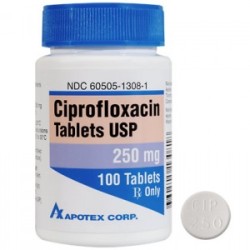Top Class Actions’s website and social media posts use affiliate links. If you make a purchase using such links, we may receive a commission, but it will not result in any additional charges to you. Please review our Affiliate Link Disclosure for more information.

However, research shows the antibiotic ciprofloxacin — sold primarily under the brand name Cipro, but also as Ciflox, Ciloxan, Baycip, Ciproxin, Prociflor, Ciprex, and Proquin — can cause nerve damage and other harmful ciprofloxacin side effects.
Ciprofloxacin and Nerve Damage
Although information about the link between Cipro and peripheral neuropathy or nerve damage has been known for years, drug warnings provided with the antibiotic were inadequate and misleading, suggesting that problems with nerve damage were “rare” and failing to disclose that users may be left with long-term effects that impact them for the rest of their life.
Peripheral neuropathy from Cipro may cause damage to the peripheral nervous system, leaving users with persistent weakness, numbness and pain. Symptoms of Cipro nerve damage may include:
- Numbness in extremities
- Burning pain
- Sharp, jabbing or electric-like pain
- Extreme sensitivity to touch
- Changes in skin, hair or nails
- Loss of coordination
- Muscle weakness or paralysis
- Heat intolerance
- Bowel and bladder problems
- Dizziness, lightheadedness
While the nerve problems often first develop as pain or discomfort in the hands and feet, the issues may continue to move up the limbs and cause more serious and permanent injuries.
Some U.S. veterans have stepped forward to say that they believe that Gulf War Syndrome, which often involves nerve damage and peripheral neuropathy, could be the result of large doses of ciprofloxacin they were given during war.
In August 2013, the U.S. Food and Drug Administration (FDA) issued a drug safety communication advising the public that it was requiring a label change to Cipro and other fluoroquinolone antibiotics to “better describe the serious side effect of peripheral neuropathy,” which is the medical term for potentially permanent nerve damage. Peripheral neuropathy can occur soon after ciprofloxacin treatment begins.
Ciprofloxacin Side Effects
In addition to being linked to peripheral neuropathy, Cipro has been linked to the following serious side effects:
- Muscle weakness
- Tendon ruptures
- Central nervous system disorders
- Tremors
- Restlessness
- Lightheadedness
- Confusion
- Hypersensitivity reactions
- Loss of consciousness
- Cardiovascular collapse
- Life-threatening skin reactions
- Toxic epidermal necrolysis (TEN)
- Stevens-Johnson syndrome (SJS)
- Clostridium difficile associated diarrhea
Cipro FDA Black Box Warning
The FDA allegedly did not act quickly on its promise in mandating Cipro label warnings, however. In 2005 and 2006, the consumer advocacy group Public Citizen and the Attorney General of Illinois petitioned the FDA to require a “black box” Cipro warning.
In 2008, both petitioners finally sued the FDA to require the Cipro warnings, and on Sept. 8, 2008, the FDA required Bayer and other ciprofloxacin manufacturers to include a black box warning on packages of Cipro, informing the public of dangerous side effects that the drug causes.
There are fears that Cipro is over-prescribed and is now no longer effective because bacteria have developed resistances to it. Indeed, fluoroquinolones are among the most prescribed antibiotics in the United States even though the FDA requires that they be used only as a therapy of last resort. Frequently, they are even used to treat conditions they aren’t approved for.
Do YOU have a legal claim? Fill out the form on this page now for a free, immediate, and confidential case evaluation. The attorneys who work with Top Class Actions will contact you if you qualify to let you know if an individual lawsuit or class action lawsuit is best for you. [In general, peripheral neuropathy lawsuits are filed individually by each plaintiff and are not class actions.] Hurry — statutes of limitations may apply.
ATTORNEY ADVERTISING
Top Class Actions is a Proud Member of the American Bar Association
LEGAL INFORMATION IS NOT LEGAL ADVICE
Top Class Actions Legal Statement
©2008 – 2024 Top Class Actions® LLC
Various Trademarks held by their respective owners
This website is not intended for viewing or usage by European Union citizens.
Get Help – It’s Free
Join a Free Peripheral Neuropathy Antibiotic Class Action Lawsuit Investigation
If you took Cipro, Levaquin, Avelox, Noroxin or Factive and were diagnosed with nerve damage, paralysis or peripheral neuropathy, you may have a legal claim. Submit your information now for a free case evaluation.
An attorney will contact you if you qualify to discuss the details of your potential case at no charge to you.
Oops! We could not locate your form.












